38 four types of precautionary statements used on labels
Question 2.docx - Question #2 Identify the four types of precautionary ... Storage precautionary statements recommend the storage and handling guidelines such as "Store locked up" or "Protect from Sunlight". The forth precautionary statement is "disposal" and it consists of the recommend disposal procedures. GHS Label Requirements, Symbols, and Classifications The four types of precautionary statements are: Prevention (ways to minimize exposure) Response (actions to take for first aid, spills, exposures) Storage (methods to safely store the product, incompatible storage conditions) Disposal (safe disposal methods of product and containers containing residual product) Classification and Label Creation,
Pesticide Labeling Questions & Answers | US EPA Oct 14, 2021 · Many companies choose to use that format to organize the precautionary information provided to the user. The precautionary statements required on a label are specified in Subparts D and E of 40 CFR Part 156. Further, EPA may require product specific precautionary label statements on a case-by-case basis through the registration process.
Four types of precautionary statements used on labels
PDF Hazard Communication Safety Program #12-101 There are four types of Precautionary Statements used on labels: Prevention, Response, Storage and Disposal. True or False 5. The HCS does not apply to consumer products when used in the workplace in the same manner as that of a normal household consumer. True or False 6. PDF US EPA - Label Review Manual - Chapter 10: Worker Protection Labeling include the signal word, certain Precautionary Statements (Personal Protective Equipment (PPE), ... types on each sub-label. The registrant may market the product under two distinctly different ... There are four types of worker protection statements that generally appear in the Precautionary . Statements of a label. They are as follows: Precautionary statement - Wikipedia Precautionary statement. In United States safety standards, precautionary statements are sentences providing information on potential hazards and proper procedures. They are used in situations from consumer product on labels and manuals to descriptions of physical activities. Various methods are used to bring focus to them, such as setting ...
Four types of precautionary statements used on labels. PDF Hazard Communication and The Globally Harmonized System of ... • Precautionary Statements describe recommended measures that should be taken to minimize or prevent adverse effects resulting from exposure to the hazardous chemical or improper storage or handling. There are four types of precautionary statements: prevention (to minimize exposure); response (in case of accidental spillage or exposure ... Label-Taurus SC 53883-279 MASTER 11-4-11 3 - ePestControl.com construction types are encountered, it may be advisable to use either 0.09% or 0.125% concentration. Apply the higher concentration at a rate of 4 gallons of solution per 10 linear feet per foot of depth. For example, for treatment of 10 linear feet with a four-foot depth, use 16 (4 x 4) gallons per 10 linear feet. Classifying hazardous chemicals National guide The GHS is a system of consistent information and terms used to classify and communicate chemical hazards on labels and in SDS. The primary aim of the GHS is to protect human health and the environment. It has been developed through co-operation between the United Nations, the International Labour Office (ILO) and the Organisation for Economic Co- Durable Labels 101: What They Are & Their Standards Durable labels leaving the workplace that contain hazardous chemicals are required to have: Pictograms; Hazard & precautionary statements A single word; Product identifier; Supplier identification; They must also contain the name, address, and telephone number of the chemical manufacturer, importer, or responsible party.
What are the 6 Elements of a GHS Label? - Computype 2. Signal Word. A signal word is used to notify the severity of the hazard. There are only two words that might hold this place on the label: "Danger" (severe hazard) or "Warning" (less severe hazard). Only one word will be on each label, to ensure it is clear to the user the severity of the hazardous chemical. 3. Precautionary statements in Hazard Communication standard ... Question 1: When the precautionary statements, "Immediately call a poison center/doctor" and "Call a poison center/doctor/…./if you feel unwell," appears on a label, is it acceptable to only use the more protective statement, "Immediately call a poison center/doctor" per Appendix C.2.4.7? How to Use Precautionary Statements Correctly on GHS Labels Some jurisdictions (i.e, US OSHA) also allow precautionary statements to be combined or consolidated to save label space. For example, "Keep away from heat, sparks and open flame," "Store in a well-ventilated place" and "Keep cool" can be combined to read " Keep away from heat, sparks and open flame and store in a cool, well-ventilated place. Precautionary Labeling: When good manufacturing practices aren't enough Good manufacturing practices are important in any food facility. In the first installment of a two-part post on Precautionary Labeling, we examined the difficulties the average consumer faces in purchasing food for someone with allergen sensitivities. Studies revealed consumers have a relatively difficult time confidently selecting allergen ...
Understanding OSHA's New Hazard Communication Labels - SafetyPro Resources There are four types of precautionary statements communicated on the labels; Prevention, Response, Storage and Disposal. To help with readability and to save space, precautionary statements can be combined. For example: Precautionary Statement 1 - Keep away from heat, spark and open flames. Precautionary allergen labelling | Food Standards Agency Aug 17, 2021 · When precautionary allergen labelling should not be used. Precautionary allergen labelling should not be used in combination with a free-from statement for the same allergen. A food cannot carry both labels e.g. “free-from gluten” and “may contain gluten.” PAL should not be used as a substitute for good food hygiene and safety practices. OSHA: Hazard Communication Quiz! - ProProfs Quiz There are four types of Precautionary Statements used on labels: Prevention, Response, Storage, and Disposal. A. True, B. False, 5. The HCS does not apply to consumer products when used in the workplace in the same manner as that of a normal household consumer. A. True, B. False, 6. GHS Label Requirements: A Simple Guide For Cleanroom Practices The hazard statement gives you this information by listing the degree and the nature of the hazard. 4. Precautionary Statement. This is essentially a guide for lowering your risk of exposure and harm due to a certain chemical. There are four types of precautionary statements: 1. Prevention statement: How to reduce your chance of exposure. 2.
The MSDS HyperGlossary: Precautionary Statements general precautionary statements, prevention precautionary statements, response precautionary statements, storage precautionary statements, disposal precautionary statements, Thus, a Safety Data Sheet or label might bear a statement such as " Pressurized container; Do not pierce or burn, even after use (P251)".
Chemical Hazard Classification and Labeling: Comparison of ... 5. GHS “hazard statements” are simple statements of hazard, a subset of what OPP calls “precautionary statements.” GHS does not specify any precautionary statements (e.g., first aid, personal protective equipment) beyond hazard statements. There are plans for future work to harmonize additional precautionary language at the international
BRIEF - Occupational Safety and Health Administration Precautionary Statements describe recommended measures that should be taken to minimize or prevent adverse effects resulting from exposure to the hazardous chemical or improper storage or handling. There are four types of precautionary statements: prevention (to minimize exposure); response (in case of accidental spillage or exposure emergency ...
Identify the four types of precautionary statements used for HazCom labels OSHA's HazCom Standard requires one of eight specific pictograms be included on container labels. For four of the pictograms, provide an example of a chemical that would require its use. Your response must be at least 150 words in length. Explain the differences between product safety labeling and environmental signage.
GHS precautionary statements - Wikipedia Precautionary statements are one of the key elements for the labelling of containers under the GHS, along with: [4] an identification of the product; one or more hazard pictograms ( where necessary) a signal word - either Danger or Warning - where necessary, hazard statements, indicating the nature and degree of the risks posed by the product,
WHMIS 2015 - Labels : OSH Answers - Canadian Centre for Occupational ... These statements can include instructions about storage, handling, first aid, personal protective equipment and emergency measures. Like the hazard statements, the wording of precautionary statements is standardized and harmonized. There are five types of precautionary statements: General. Prevention. Response (including first aid). Storage ...
A Guide To Labeling Systems For Chemicals - Precautionary statements, including handling recommendations, first aid and fire instructions, Right Column, - GHS pictograms, - Signal word, - Hazard statements, - Supplemental information, including expiration date, manufacturing date, recommended personal protective gear and directions for use,
GHS Labeling Requirements: The Definitive Guide [2021 Update ... - Luminer 4. Precautionary Statements The point of these descriptions is to quickly alert workers to the kinds of precautions they should take to minimize the chances of exposure, improper storage, or incorrect handling of the hazardous chemical. There are four precautionary statements that can be used on GHS labels:
Do you - and your workers - understand the new GHS labels? Annex 3 of the GHS Purple Book includes precautionary statements and pictograms that can be used on labels. Annex 3 includes four types of precautionary statements covering: prevention, response in cases of accidental spillage or exposure, storage, and disposal. The precautionary statements have been linked to each GHS hazard statement and type ...
Lists of GHS Precautionary Statement and P Code List of GHS Precautionary Statements and P Codes. P101: If medical advice is needed, have product container or label at hand. P102: Keep out of reach of children. P103: Read label before use. P201: Obtain special instructions before use. P202: Do not handle until all safety precautions have been read and understood.
PDF Chapter 4: HAZARD COMMUNICATION: Signs, Labels, Material ... - Lehman The following is a description of four of the most commonly used label types: ANSI Chemical Label: American National Standard Institute (ANSI) has published a voluntary labeling ... • Precautionary statements such as: o Wash thoroughly after handling o Avoid contact with eyes, skin and clothing
Hazard Communication Training - Occupational Safety and ... Signals Words: Danger Caution Warning Secondary labelling “Always read the label before you move, handle, or open a chemical container” Sample Label WD-40 CAS No’s 8052-41-3, 68476-85-7, 64742-65-0 EYES Contact with eyes may cause irritation, tearing, and redness SKIN Prolonged contact with the skin may cause drying or irritation of the ...
How to fill out an SDS Label - Help Center Precautionary Statements describe recommended measures that should be taken to minimize or prevent adverse effects resulting from exposure to the hazardous chemical or improper storage or handling. There are four types of precautionary statements: prevention (to minimize exposure);
Hazard statements, precautionary statements and signal words - HSE Examples of precautionary statements include: wear eye protection, do not eat, drink or smoke when using this product, avoid release to the environment, in case of inadequate ventilation wear...
GHS Label Requirements for Shipping - eSafety Training There are four types of precautionary statements: Prevention. To minimize exposure to the hazardous chemical, Response. To appropriately respond and provide first-aid in the case of accidental spillage or exposure, Storage. To ensure proper storage of hazardous chemical, Disposal. To ensure the safe disposal of the hazardous chemical,
Precautionary statement - Wikipedia Precautionary statement. In United States safety standards, precautionary statements are sentences providing information on potential hazards and proper procedures. They are used in situations from consumer product on labels and manuals to descriptions of physical activities. Various methods are used to bring focus to them, such as setting ...
PDF US EPA - Label Review Manual - Chapter 10: Worker Protection Labeling include the signal word, certain Precautionary Statements (Personal Protective Equipment (PPE), ... types on each sub-label. The registrant may market the product under two distinctly different ... There are four types of worker protection statements that generally appear in the Precautionary . Statements of a label. They are as follows:
PDF Hazard Communication Safety Program #12-101 There are four types of Precautionary Statements used on labels: Prevention, Response, Storage and Disposal. True or False 5. The HCS does not apply to consumer products when used in the workplace in the same manner as that of a normal household consumer. True or False 6.
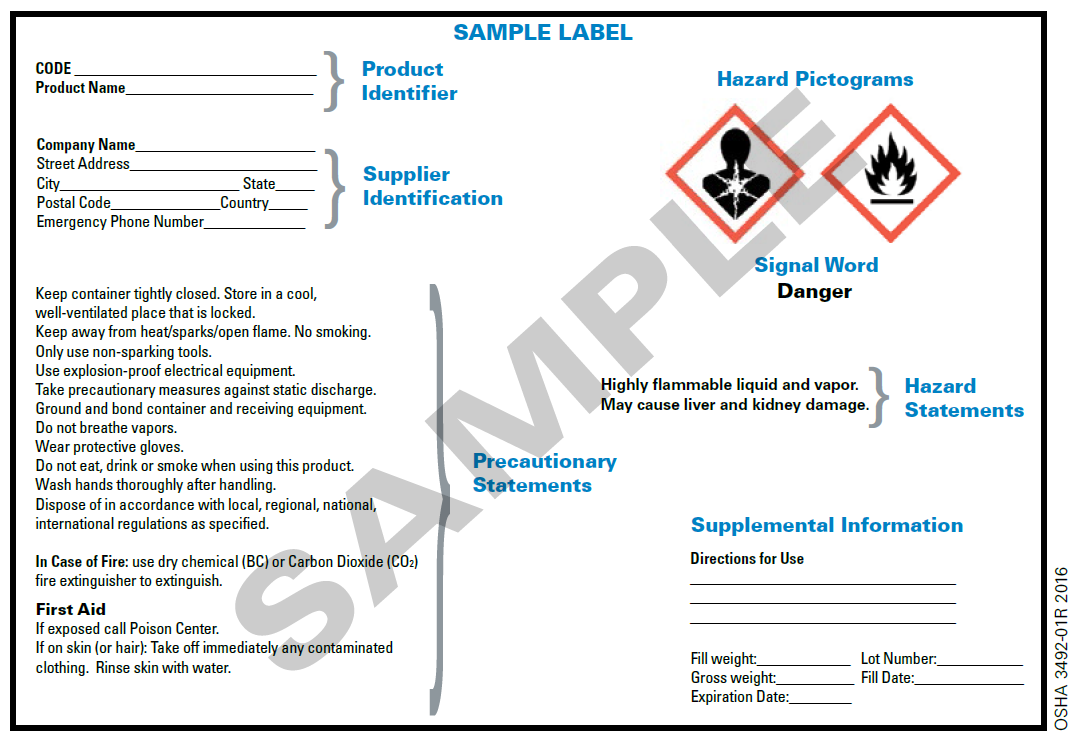

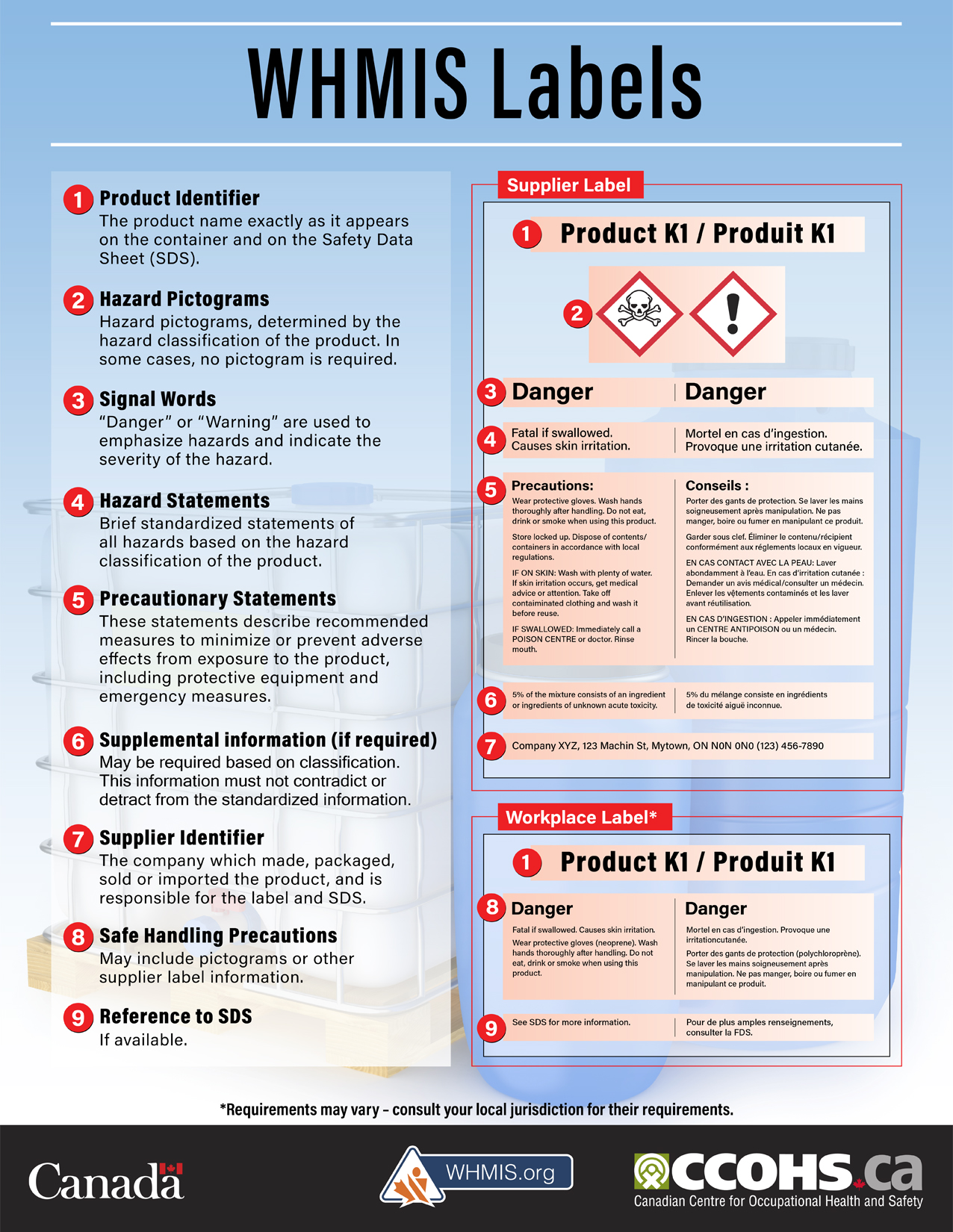
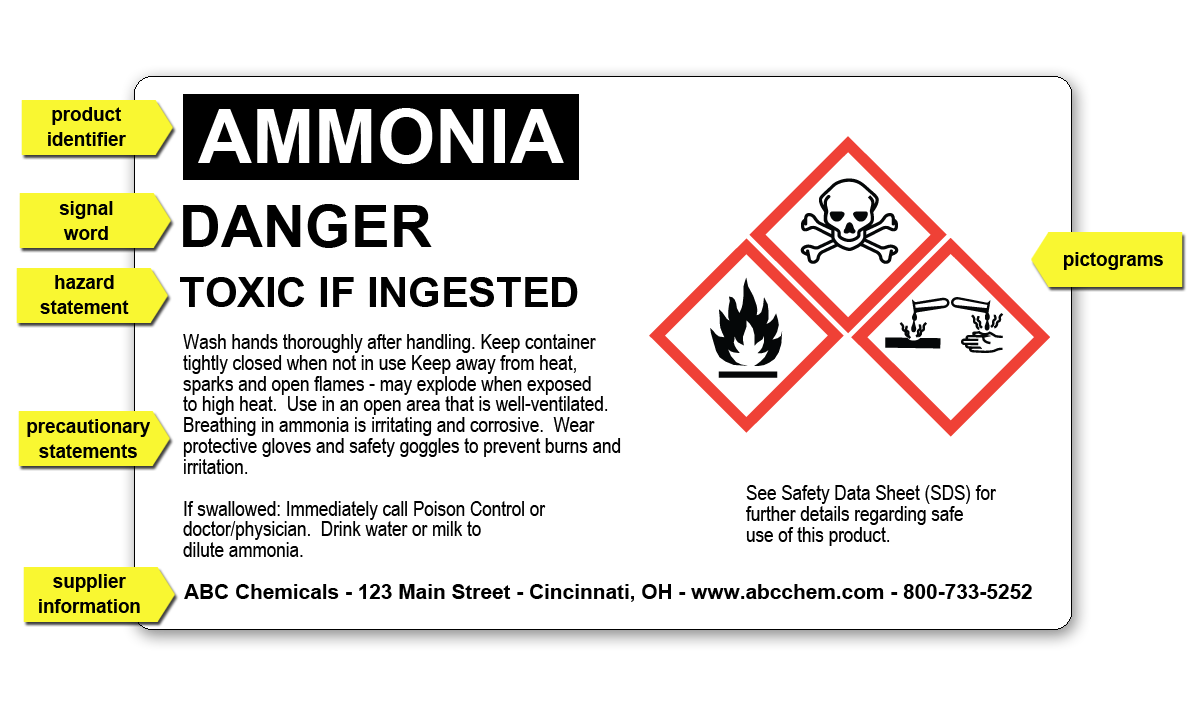




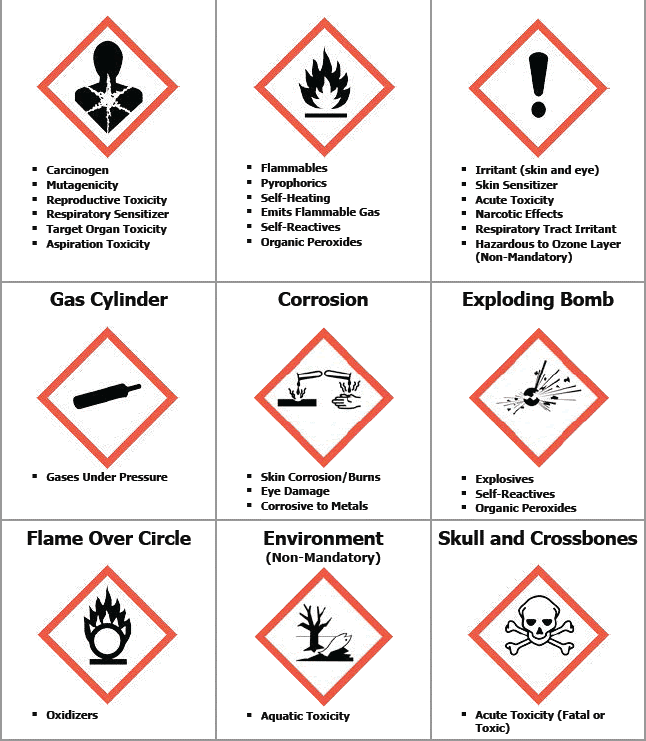
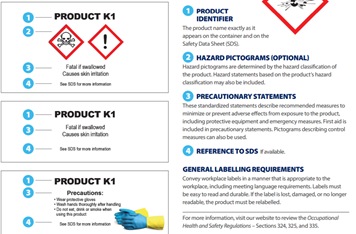

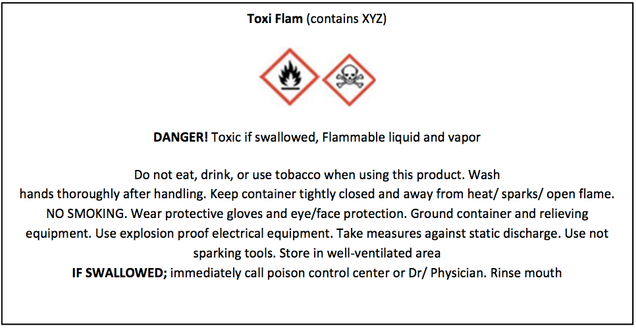
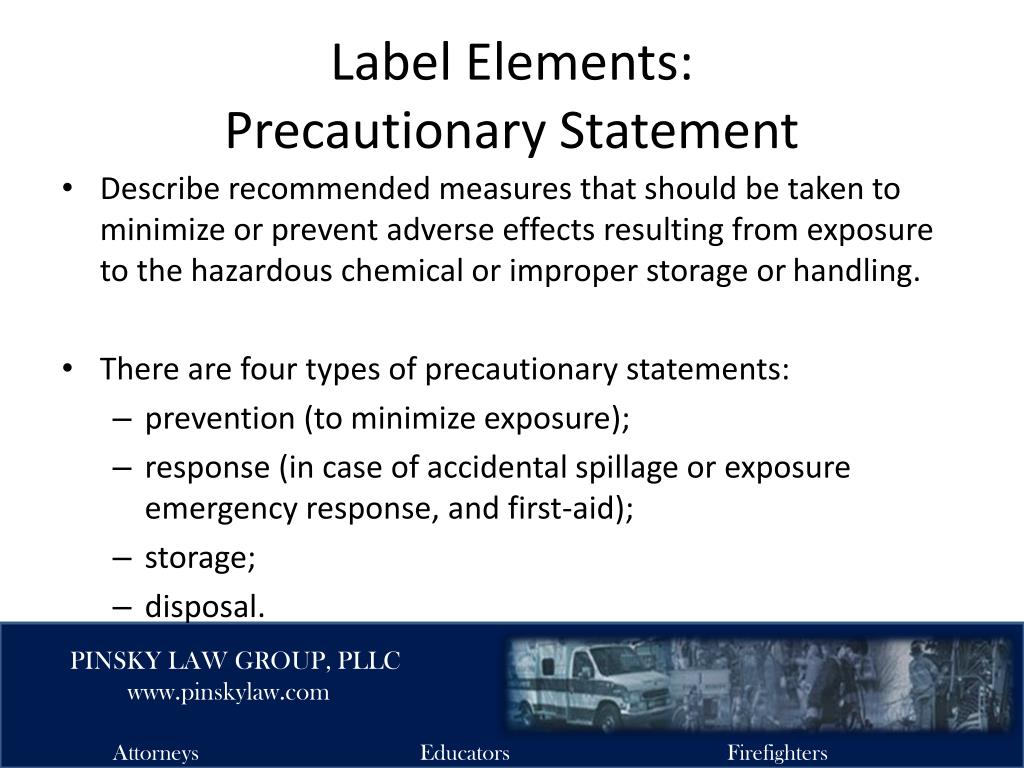

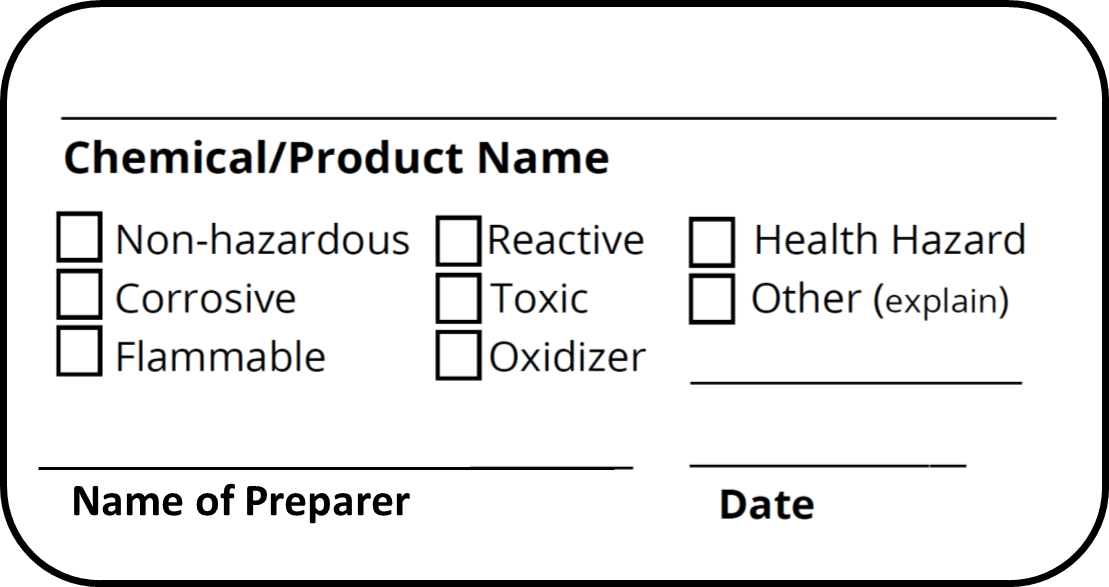
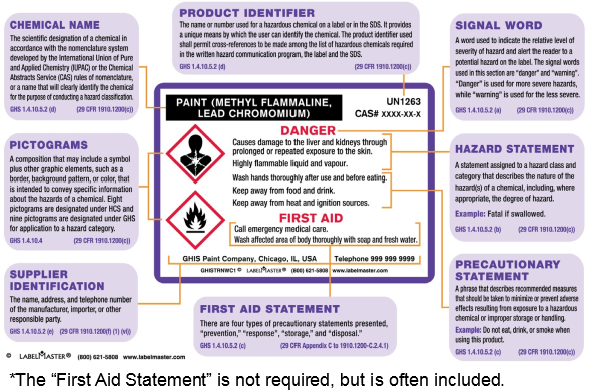






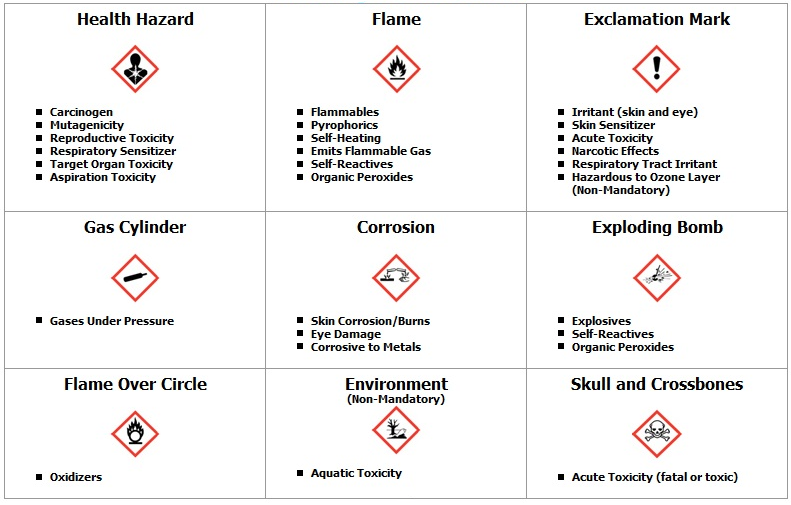
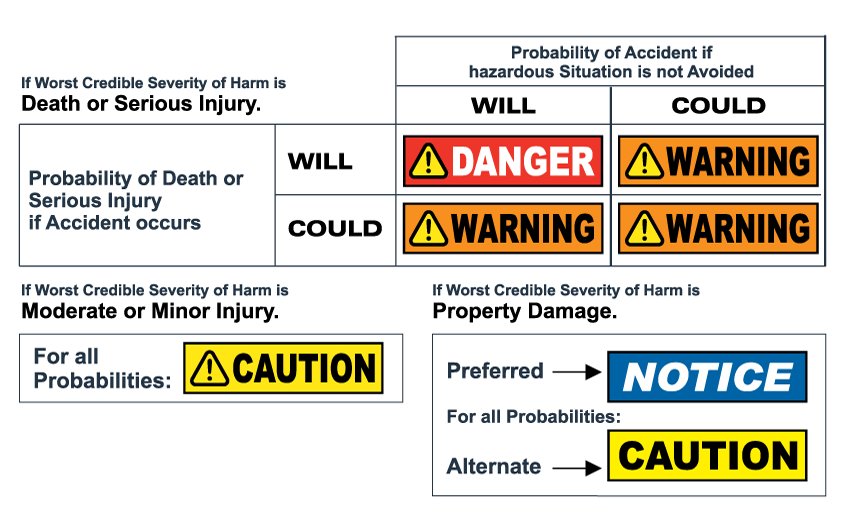

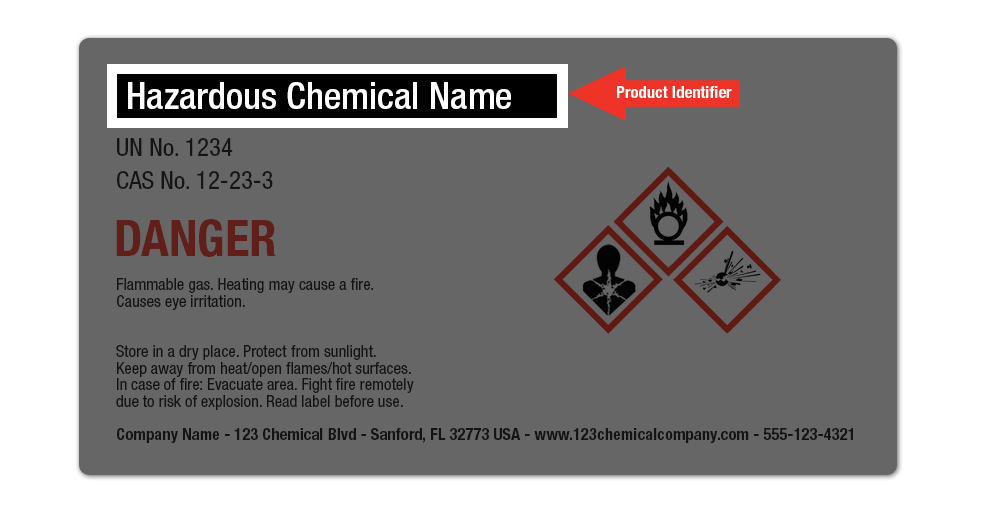


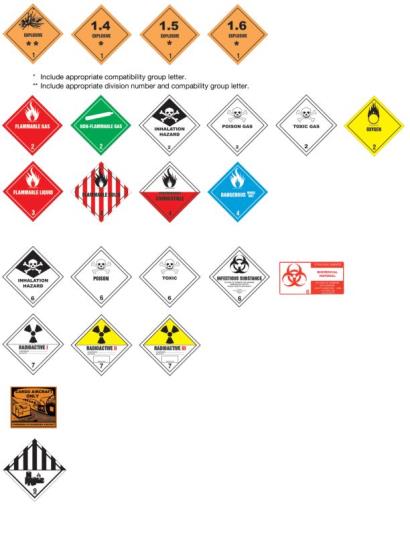

Post a Comment for "38 four types of precautionary statements used on labels"